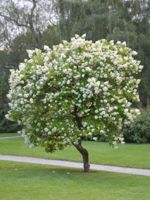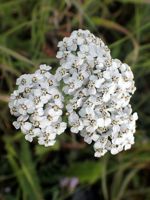Mon-Fri 9am - 5pm Mountain time
Japanese Tree Lilac vs Yarrow
Syringa reticulata
Achillea borealis (Previously Achillea millefolium)
NOT AVAILABLE THIS SEASON - MIGHT RETURN
SOLD OUT
Japanese Tree Lilac is an attractive, heavy-flowering lilac with fragrant white blossoms. It can be pruned to a single stem or grown as a multi-stemmed shrub.
Japanese Tree Lilac's dark reddish-brown bark peels as the tree ages, creating visual appeal for any yard, especially in the winter.
This tree is often planted along boulevards and its attractive white flowers signal spring to all who drive by.
Yarrow is a herbaceous, native wildflower that is found across Canada. It features large, flat clusters of tiny white flowers. The blooms attract a variety of pollinators, making it an ideal choice for pollinator gardens. While partial shade is tolerated, the best flowering occurs in full sun. Yarrow is resistant to deer and rabbits, making it both a beautiful and practical addition to your landscape.
The entire plant is edible, but leaves and flowers are most commonly consumed. They have a strong licorice scent and a mild sweet flavor that is similar to tarragon. Yarrow leaves can also be used as a natural insect repellent.
It is important to plant Yarrow in the right place, it can spread quickly via both rhizomes and self-seeding. Deadheading the spent flowers will extend the bloom season and can help limit self-seeding.
Japanese Tree Lilac Quick Facts
Yarrow Quick Facts
Toxicity: toxic to dogs, cats, and horses
In row spacing: 0.9 m (3 ft)

